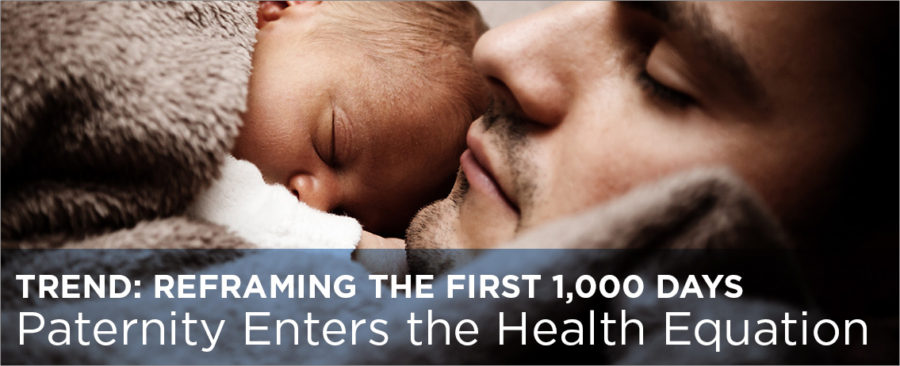TREND: Reframing the First 1,000 Days

Paternity Enters the Health Equation
For decades, medical researchers have studied how a mother’s lifestyle, such as what she eats and drinks during pregnancy, can impact the developing baby. When it comes to the health of the baby, it’s been a narrowly mom-centric world and responsibility, with the health of the father’s sperm—and his part in creating a supportive and healthy environment—essentially ignored.
That will change.
As Dr. Sergio Pecorelli argued at the 2017 Summit, disease prevention begins before a baby is conceived (and also in the 180 days of preconception). He noted: “We know that the father’s spermatozoa lasts 90 days within the testes. And in those 90 days, a lot of things can happen.”
The new science of epigenetics explains why a healthy lifestyle is important for both the mom and dad at conception. Researchers believe environmental agents/experiences influence human heredity, and these modifications to genomes can be transmitted to offspring. It is very possible that both paternal and maternal obesity could contribute to the inheritance of an obesity syndrome in their offspring. Obese fathers could transmit epigenetic markers that regulate brain development and appetite control, which could predispose a child to obesity.
Exercise, a healthy diet, sleep, meditation and stress-reduction can be effective therapeutic strategies to prevent dysfunctional epigenetic changes. But an unhealthy lifestyle could affect the epigenome of reproductive cells (the egg and the sperm) and have a significant effect on future generations, thus impacting the baby’s health and disease risk.
We expect the medical world to embrace new guidelines that go well beyond “no smoking or alcohol during pregnancy.” And these guidelines will include dads as well as moms.
Forecasting The Future
It’s time to acknowledge that it takes two people to make a baby. And that the health of the sperm when conception occurs—as well as the father’s lifestyle preconception, during pregnancy, and beyond—is as important as the mother’s ovum and lifestyle. We predict a shift from a focus on the traditional “1,000 days” of pregnancy (the 270 days of pregnancy plus the first two years of a child’s life) to include the health/lifestyle of both the mother and the father during the 180 days before they conceive a baby.
This trend is driven by medical research, and more is ahead. For example, an ambitious three-year study under Dr. Pecorelli will examine how the first days of human development, including preconception and pregnancy, can impact up to 70 percent of an individual’s lifetime health—looking at how diet, exercise, stress and other early wellness interventions make an impact.
And we predict that more medical professionals will recommend a variety of wellness approaches for moms, dads and even babies in the future. All of which will be a hot topic at the 2018 Global Wellness Summit.
This is an excerpt from the TRENDIUM, a bi-weekly communication exploring the wellness trends identified in the 2018 Global Wellness Trends Report.
Subscribe to the TRENDIUM. | View TRENDIUM Full Issue.
